Groundbreaking reporting
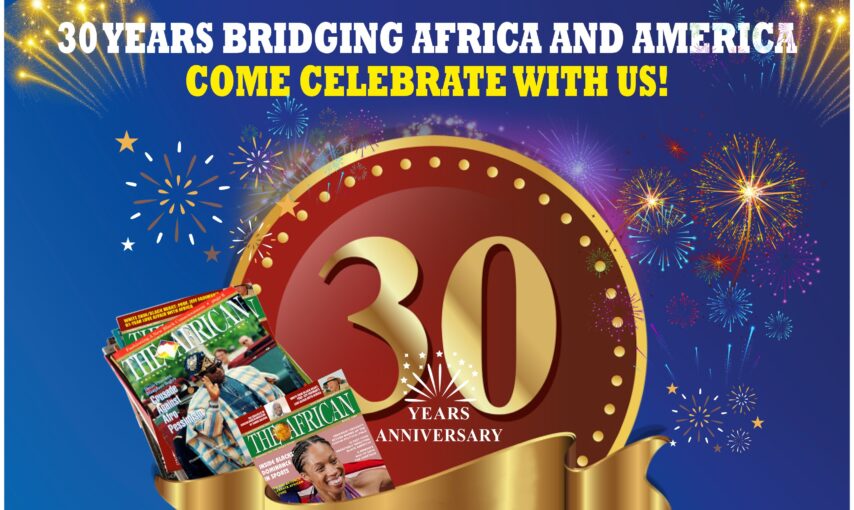
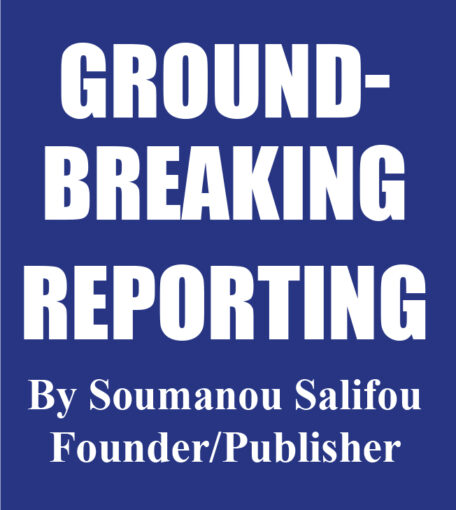 The African is distributed by the same large, nation-wide U.S. magazine and book distributors that carry the nation’s best-known magazines. It stands tall beside these “elders” on the same shelves. However, in terms of reach, size, and, therefore, revenue, The African is at best a small fish in the huge ocean of American periodicals where, according to the 2023 data, mainstream magazines like Better Homes and Gardens, Southern Living, and People respectively boasted circulations of 3,039,359, 2,812,420, and 2,540,107.
The African is distributed by the same large, nation-wide U.S. magazine and book distributors that carry the nation’s best-known magazines. It stands tall beside these “elders” on the same shelves. However, in terms of reach, size, and, therefore, revenue, The African is at best a small fish in the huge ocean of American periodicals where, according to the 2023 data, mainstream magazines like Better Homes and Gardens, Southern Living, and People respectively boasted circulations of 3,039,359, 2,812,420, and 2,540,107.
Nonetheless, as The Library Journal—a highly regarded American trade publication for librarians founded in 1876 that does pre-publication reviews of several hundred popular and academic books each month—aptly wrote in a review about The African in August 1999, “Readers should expect the unexpected with this comprehensive bimonthly. Committed to ‘building bridges’ between the United States and Africa, it exposes its audience to the politics, culture and viewpoints of a continent about which many Westerners know very little.” The very positive review, which landed by surprise on my fax machine one late evening, concluded: The African offers a window into a misunderstood continent and would make a valued addition to any public or academic institution.”
A recognized bridge-builder
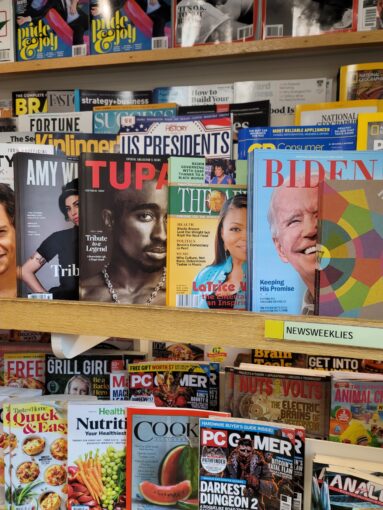
By building bridges between the United States and Africa, as noted by The Library Journal reviewer, The African, indeed, fills a void. Right from the start, the magazine was warmly greeted by readers across Canada and the United States, including one John M. Rodgers in New York who wrote to us, “It’s about time black people have awakened from our deep sleep and come up with something innovative.”
Certainly with a few exceptions, most events involving the United States and Africa receive coverage in The African based on exclusive interviews with the officials behind the events and our own eyewitness reports. By the same token, to fulfill the most important role of journalism, which is to help people understand the events shaping their own environment and the world, The African also originates feature stories on subject as diverse as economy, politics, culture, relations between Africa and Black America, and more.
The promotion of U.S.-Africa trade and investment
Besides the U.S. government’s vast apparatus to promote trade and investment overseas, including Africa, there is no higher authority in the field than the Washington, D.C.-based Corporate Council on Africa, C.C.A., which is known especially for its annual U.S.-Africa Business Summit that brings together about one thousand African and American leaders. The African got involved in C.C.A.’s activities as early as 1999, when the second edition of the summit was held in Houston, Texas.
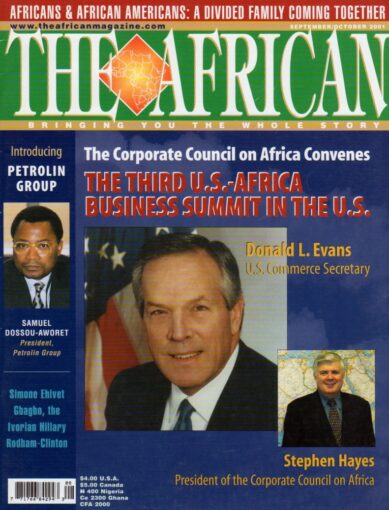
For several summits in a row, the U.S. Secretary of Commerce’s exclusive “Letter to Summit Participants,” which I instituted in 1999, was The African’s signature contribution to the single largest gathering of African and American leaders. It was indeed in this magazine, and none other, that President Clinton’s Commerce Secretary, Richard Daley, warmly welcomed participants to the summit held in Houston, urging American businesses to capitalize on the lucrative African marketplace. He announced U.S. government’s policies geared toward improving trade with Africa “to integrate Africa more fully into the global economy and transforming our relationship to one based on shared prosperity through trade and investment.” Daley’s immediate successor, President George W. Bush’s Commerce Secretary, Donald. L. Evans (featured on this cover), and subsequent secretaries helped carry on the tradition by writing the iconic letter and sending it to our newsroom with their official photo.
The African’s special issue for the third summit held in Philadelphia, Pennsylvania in 2001, was produced in close collaboration with then-C.C.A.’s communications director, with the agreement that the printer would send 1,000 copies straight to the summit’s venue. Which happened, and C.C.A.’s own staff got the magazines in the hands of every participant, unlike other print magazines present at the summit that were confined to the tables allocated to them by the organization.
Fast-forward to the latest summit held in Dallas in May 2024: there were three African print magazines present, including The African, but this magazine was the only one that carried an exclusive interview with the organization’s president/CEO. And that was not a first for a publication driven by the desire to always reach out to the top, having interviewed all C.C.A.’s presidents and CEOs and two of its chairmen since the second summit, including its billionaire chairman Maurice Tempelsman. The business tycoon was then, among other things, chairman of the board of directors of Lazare Kaplan International, Inc., the largest cutter and polisher of “ideal cut” diamonds in the United States.
The story of The African’s coverage of C.C.A. would not be complete without recognizing the hefty advertisement revenue the magazine has secured in the process upon the organization’s recommendation to its members. Not the least, C.C.A. graciously provided accommodation for the magazine’s team in Houston in 1999.
Accolade from the White House
A short and sweet letter from President George W. Bush in May 2001 in which the president wrote “I welcome information from Americans across the country, and I value your input,” had the effect of steroids on the entire team of The African, pumping us up and making us think we must be doing the right thing!
Much earlier on, in a letter dated August 13, 1999, Rosa Whitaker, then-Assistant United States Trade Representative for Africa, “strongly” encouraged The African team to continue to make our contribution to the promotion of trade and investment between the United States and Africa. Among other things, Whitaker wrote, upon reading some of the magazine’s issues: “I read with great interest your ‘Publisher’s Statement’ citing President Obasanjo as a ‘symbol of hope’ for Nigeria. Indeed, the United States has a special relationship with Nigeria. Last year, Nigeria ranked as the highest sub-Saharan African importer of U.S. goods, with U.S. exports to Nigeria totaling over $4 billion.”
Connecting the global Black family
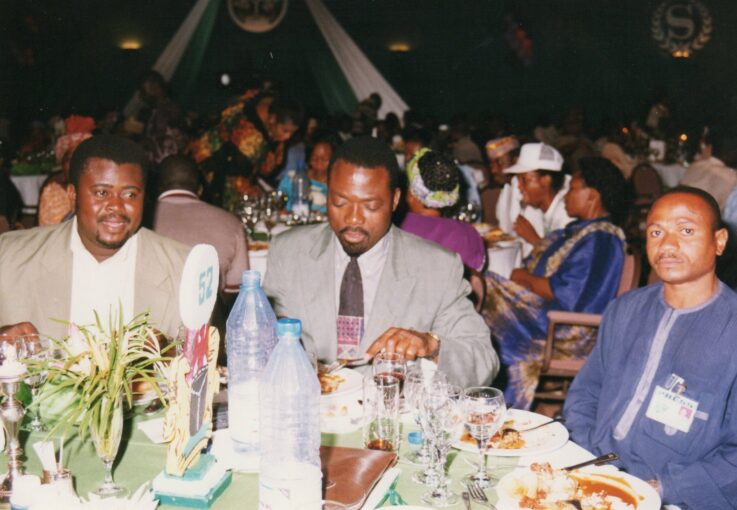
Inside the overall effort to fight the negative image of Africa in the United States, The African uses the proven power of journalism revive the kinship and the solidarity that Black leaders of the past and the present fought for and died for. To do so, the magazine’s staff writers create features on various aspects of Black History that are published in a category we have titled Africa/Black America. The African also benefits from the valued knowledge of Black and white africanists who share with our readers the fruit of their work on Africa.
The magazine serves the same purpose with its first-hand, regular coverage of major events involving the global Black family in Africa or in the United States. The long list of such events includes the May 31, 1999 inauguration of Olusegun Obasanjo as Nigeria’s first civilian president in 16 years, which was attended by probably one hundred African Americans from all walks of life; and the biennial African/African American summit initiated by the late Baptist Minister Leon Sullivan.
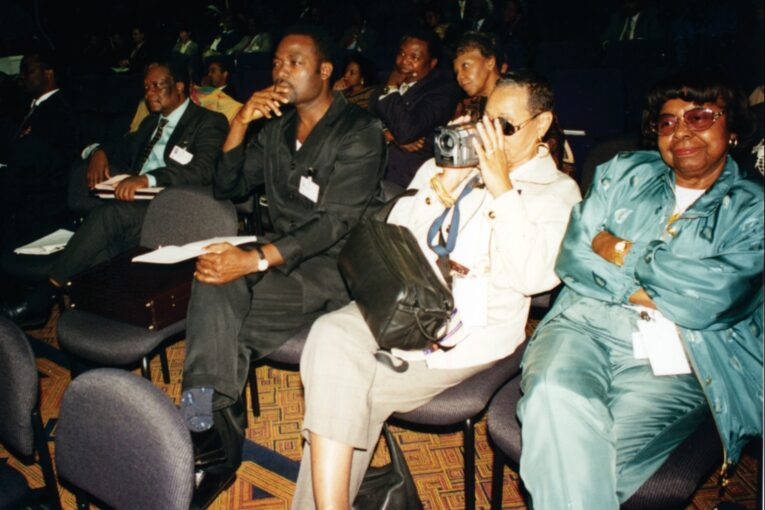
James City in North Carolina, Richmond in Virginia, Abomey and Ouidah in Benin, Timbuktu in Mali, and Goree Island, in Senegal are just a few of dozens of places with Black history landmarks that The African’s reporters have visited so far to collect first-hand information to write about our history.
The reporting sometimes gets quite intense. Case in point: in 1994, when the magazine’s team visited the slave quarters of the ill-famed slave depot on Goree Island, the lead reporter—the publisher himself—lied on the floor of one of the slave dungeons, with his arms stretched, to show the readers the tiny size of the filthy cells where cruel white slave traders packed the African men, women and children they acquired from African chiefs greedy and cruel enough to sell their own people, before stacking them in the bellies of slave ships like sardines.
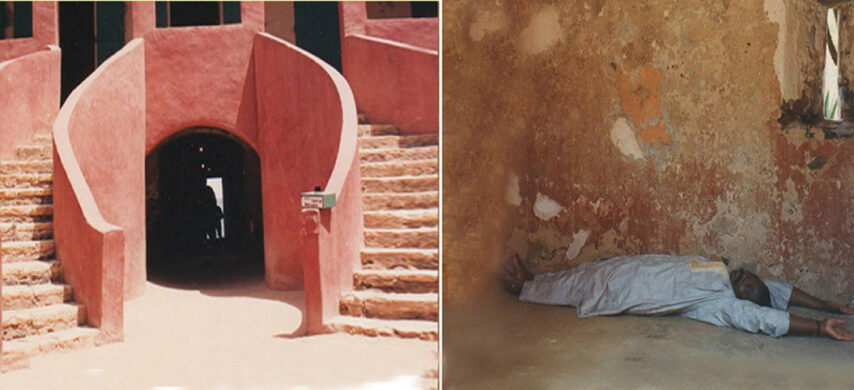
If history is the inescapable link between Africans and African Americans, so are some modern-day developments such as the rise of Barack Obama, the son of an African man, to the presidency of the United States, making him the biggest link today between Africa and the United States.
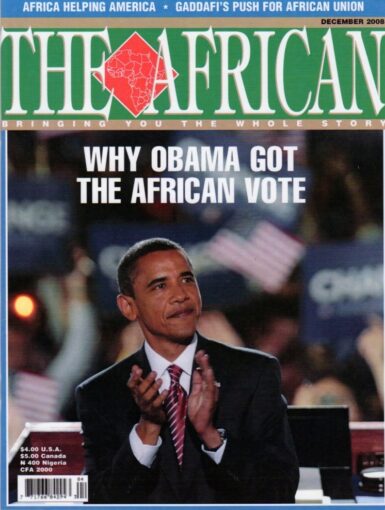
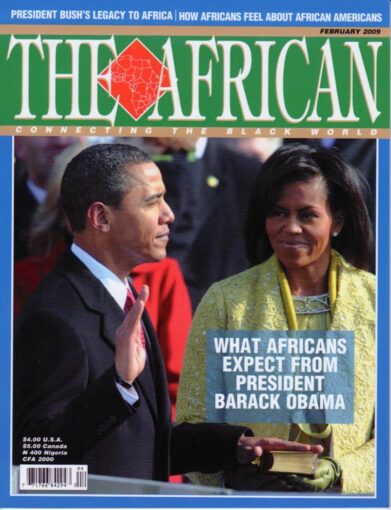
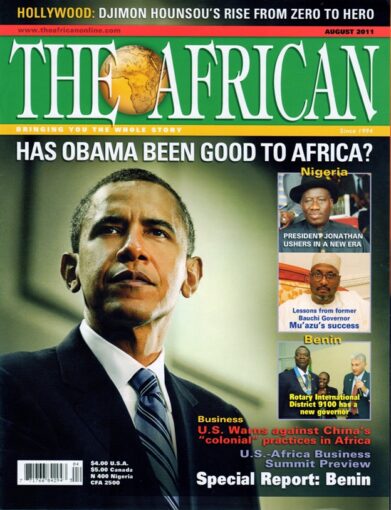
Obama’s candidacy for the presidency of the United States in 2007 developed into a global sensation, but it took a while for that to happen. For months and on, American voters were unsure about the promise of change repeatedly made by the first-term senator from Illinois who did not have the civil rights credentials of a Jesse Jackson. Instead, Black America, which traditionally votes for the Democratic party, overwhelmingly favored former first lady Hillary Rodham Clinton. One may remember the vulgar remarks caught on a hot mike made by Rev. Jesse Jackson in reference to Obama in July 2008, only four months before Election Day, “I want to cut his nuts,” or America’s first Black billionaire, Black Entertainment Television founder Robert Johnson’s disparaging comments about Obama smoking weeds. These unpleasant developments forced Obama into a campaign within the campaign to convince Black voters.
By contrast, Obama’s large African family got fired up much earlier on, resorting to prayer vigils and other spiritual actions to see him elected.
Unlike all other publications in the United States, The African provided extensive coverage of the Obama mania throughout Africa, from Gabon to Mali, Togo, and elsewhere. To do so, the magazine didn’t rely on online stories created by others. The massive reporting was done by its own writers dispatched in Africa and its local correspondents in various countries who created the first-hand stories published in our special issue with the cover title, “Why Obama got the African vote.”
Despite our effort to point out the unquestionable reality that Barack Obama is the quintessential new bridge between Black Africa and Black America today, we did not shy away from relaying the sharp criticism that some Africans, including members of the elite, have voiced about the first Black U.S. president, basically—unfairly so—blaming him for not ending poverty on the continent. Nor did The African fail to expose the hypocrisy of some of our African American sisters and brothers who pursue nothing but their personal material interests in Africa under the disguise of love for the motherland. I sometimes literally call out influential members of the African or the African American community in my Publisher’s Statement.
African culture at our readers’ fingertips
Another important lane on the U.S.-Africa bridge The African has committed to building is the coverage of Black culture through the African culinary art brought to these shores by our enslaved ancestors; the African musical elements they brought with them which birthed several universal genres: gospel, blues, Jazz, and hip hop; that is not to mention other artistic talents the slaves brought with them.
We were proud to introduce the American public to some features of African culture that no American periodicals had carried before us. An example of this groundbreaking report is our coverage of the ultra-secret funeral rituals performed in a convent by a Gabonese all-male secret society to send off a traditional chief (article shared in this magazine).
Driven by our eagerness to expose Black women’s gigantic contributions to society which are yet to be fully recognized, we started our Annual Women’s issue in 1997, featuring that year then-Nigerian first lady Maryam Abacha on the cover. Other prominent women figures followed, including Michelle Obama, and so did everyday-women.

(Official White House Photo by Pete Souza)
“The blood of Africa runs through my veins, and I care deeply,” said former first lady Michelle Obama to a group of visiting African youth in Washington, D.C. in August 2014. The remarks by the trailblazer first lady struck a special chord in the hearts and minds of the entire staff of our trailblazer magazine, giving us hope that one day, thanks to the hard work of The African and many others, all African Americans will be mindful that the blood of Africa does run through their veins, too, with the potential of leading us to that place in history where our African American children’s children will say loudly, echoing the words of the late “King of Soul,” James Brown, “I am African and proud.”

